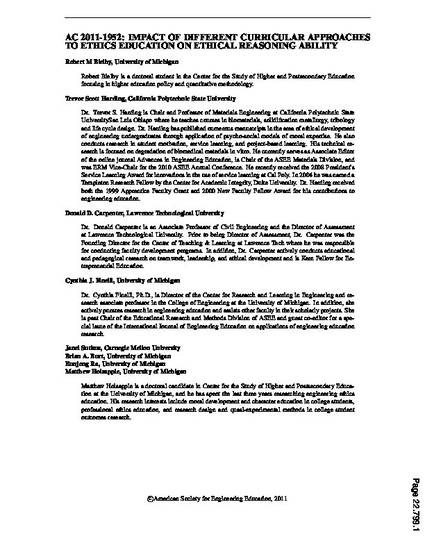
Presentation
Impact of Different Curricular Approaches to Ethics Education on Ethical Reasoning Ability
2011 ASEE Annual Conference & Exposition
(2011)
Abstract
Impact of Different Curricular Approaches to Ethics Education on Development of Ethical Reasoning As engineers enter the modern workplace, they must not only be aware of the existing ethical standards required to become a professional engineer, but they must also be prepared to reason through ethical problems and act appropriately in their everyday work. However, recent research has shown that the curricular approaches typically used to develop these skills in engineering undergraduates – notably case studies and emphasis on ethical codes – have a limited impact on students’ ability to address ethical issues. Therefore, in this study we evaluate a number of different curricular approaches to ethics education (e.g. roleplaying activities, games, and films) that could be used to prepare students for ethical issues and assess their impacts on students’ development of ethical reasoning. Astin’s Input-Environment-Outcome (IEO) model views student outcomes (such as ethical development) as the product of the interaction of inputs (such as student characteristics and prior experiences) and environmental stimuli (such as curricular and cocurricular experiences and institutional culture); in this study, we apply Astin’s IEO model to development of ethical reasoning. We use the undergraduate engineering curriculum as the “environment,” and study several other input factors as we address the following research questions: Do different curricular approaches to ethics education have differential impacts on undergraduate stuents’ ethical reasoning ability? How do the impacts of these curricula differ for students across academic class-years? We analyzed data collected as part of our Survey of Engineering Ethical Development conducted at 18 institutions across the U.S. These institutions were selected to provide a wide range of institution size, program concentration, and geographic region. Amongst other things, the survey included items assessing students’ demographics and background characteristics, their curricular, co-curricular, and extracurricular experiences, and their level of ethical reasoning (as measured by the Defining Issues Test-2 (DIT-2)). Here we assess the differential impact of the curricular approaches to ethics education across students’ undergraduate experiences. Preliminary results indicate that some curricular approaches are common at many of the institutions in our sample (e.g., presentation by a professor in an introductory engineering course), while others are more institution-specific. Further, students’ ethical reasoning ability varies both across institutions and within institutions by class-year, possibly because of the different types of ethics education to which students have been exposed. In additional analysis for the final paper, we will apply indicator variables as predictors (representing exposure to different curricular approaches), along with several covariates, to explain the differences in the development of ethical reasoning by class year. This will allow us to identify curricular approaches to ethics education that have the greatest impact on students’ ethical reasoning ability at different points during their education.
Disciplines
Publication Date
June 26, 2011
Location
Vancouver, BC
Comments
2011 American Society for Engineering Education. Other scholars may excerpt or quote from these materials with the same citation. When excerpting or quoting from Conference Proceedings, authors should, in addition to noting the ASEE copyright, list all the original authors and their institutions and name the host city of the conference.
Citation Information
Bielby, R. M., & Harding, T. S., & Carpenter, D. D., & Finelli, C. J., & Sutkus, J. A., & Burt, B. A., & Ra, E., & Holsapple, M. (2011, June), Impact of Different Curricular Approaches to Ethics Education on Ethical Reasoning Ability Paper presented at 2011 ASEE Annual Conference & Exposition, Vancouver, BC. https://peer.asee.org/18080
